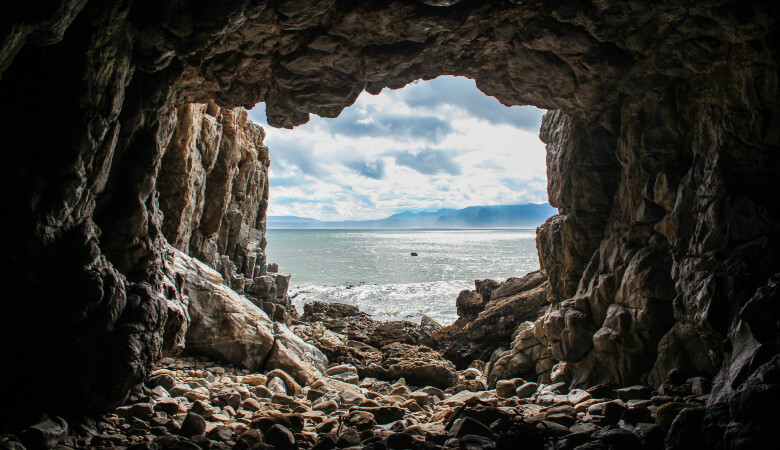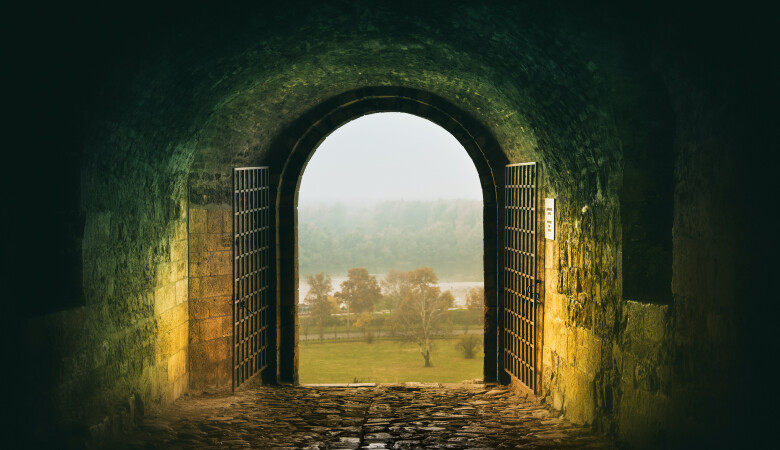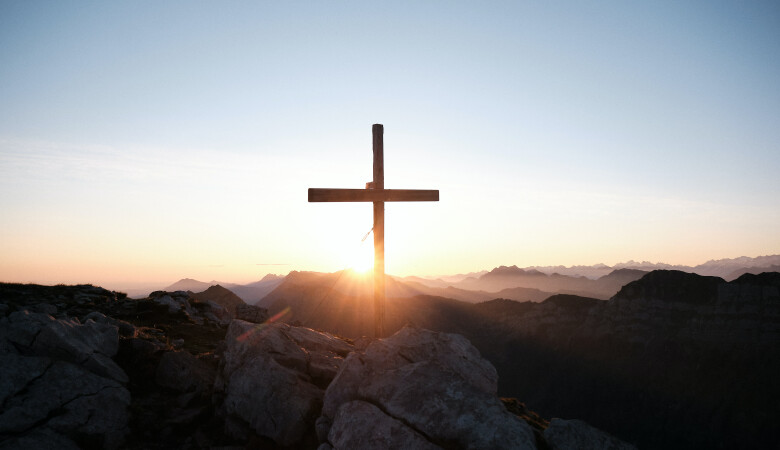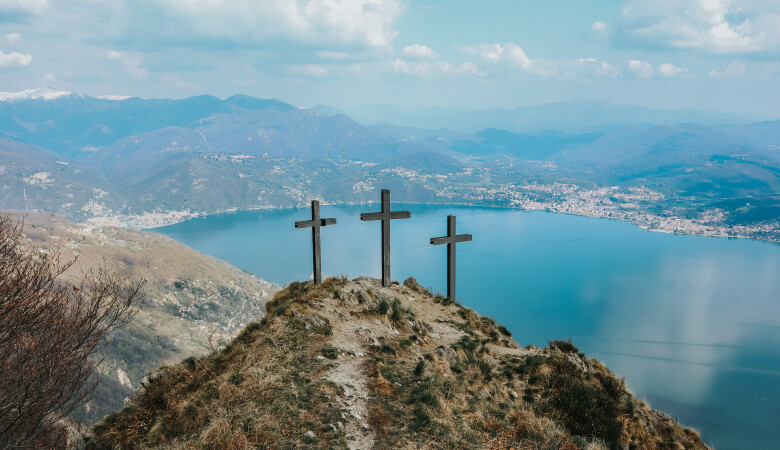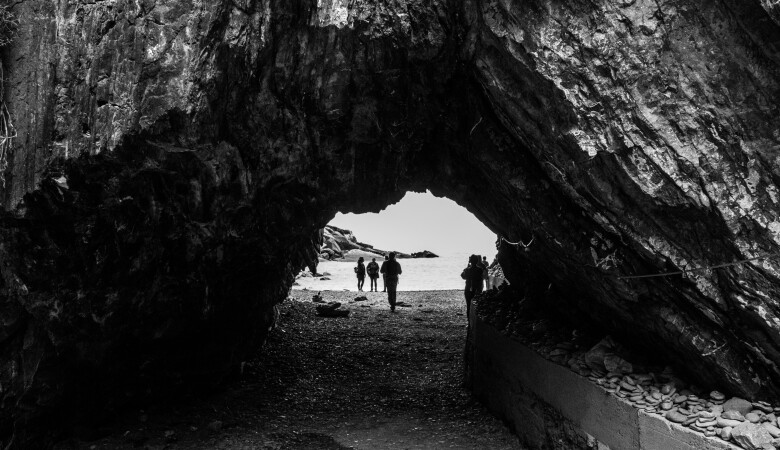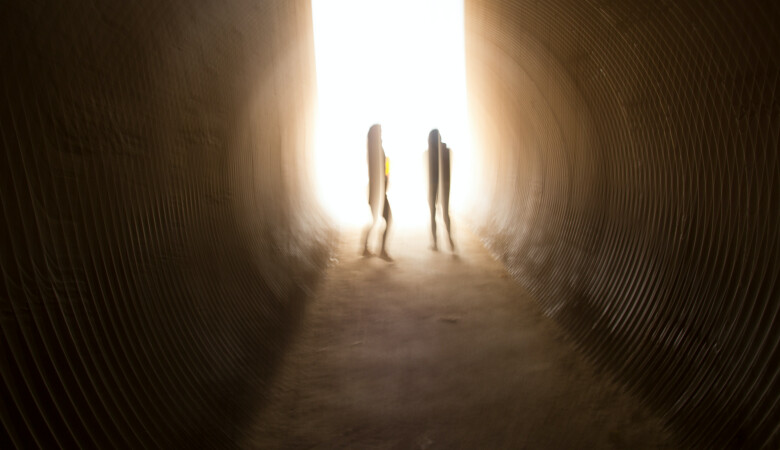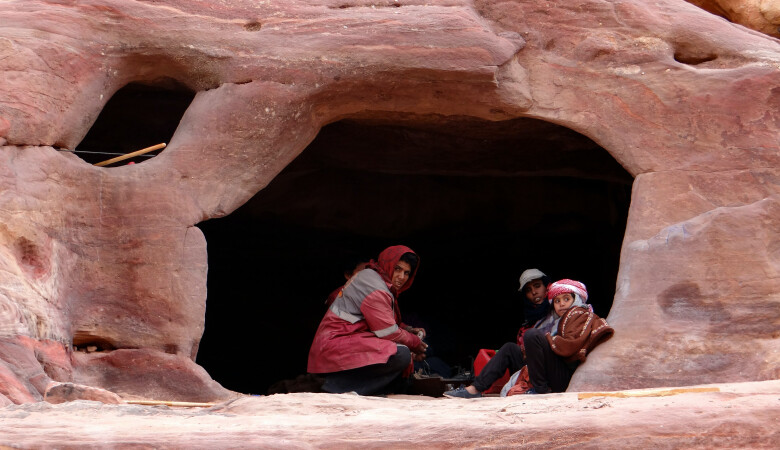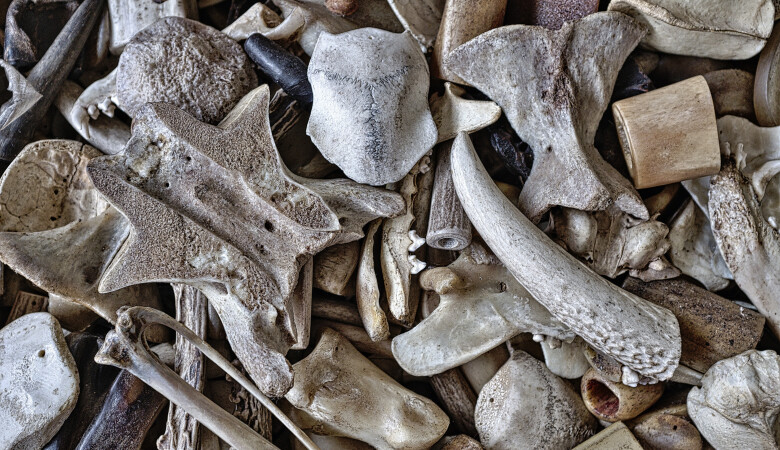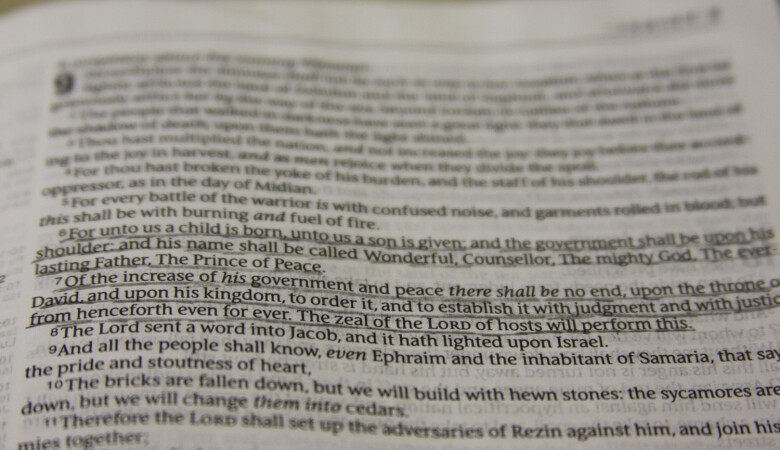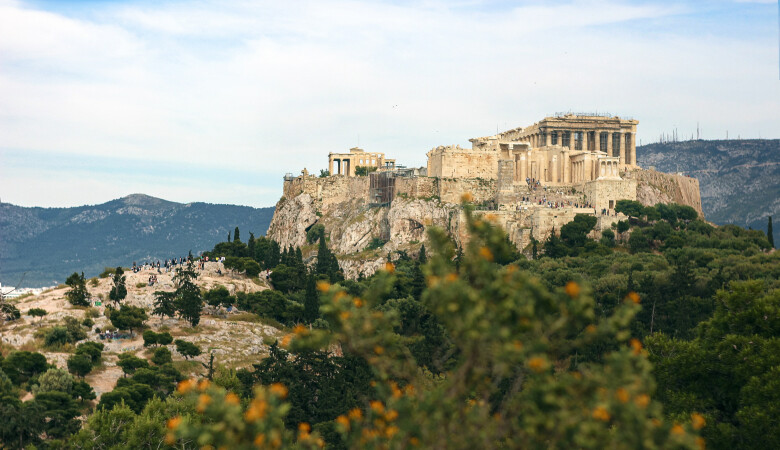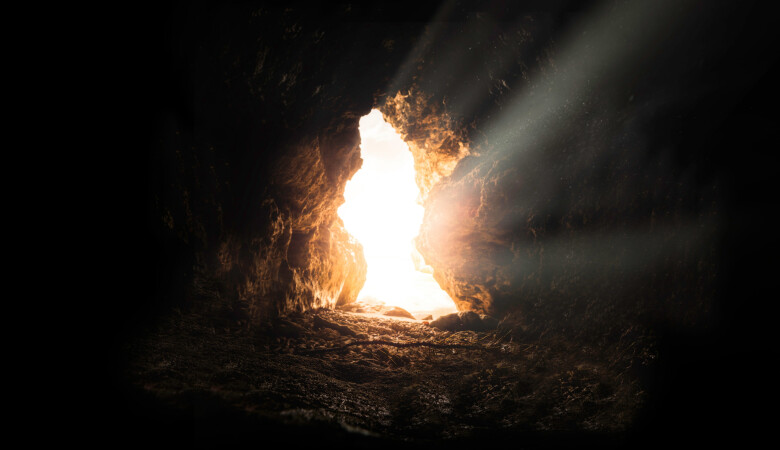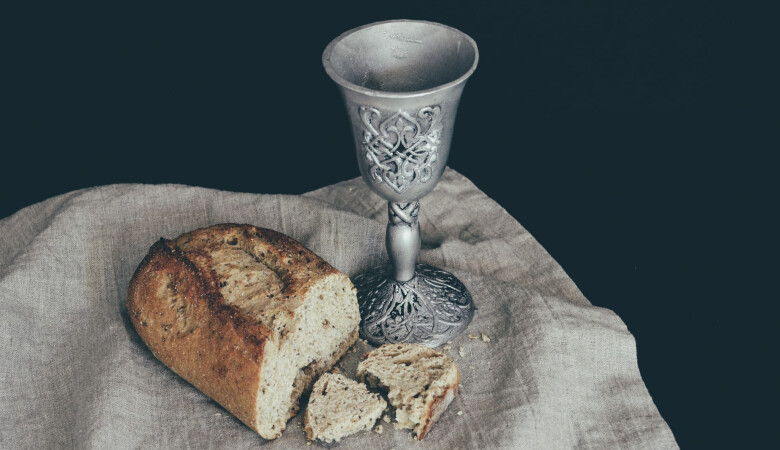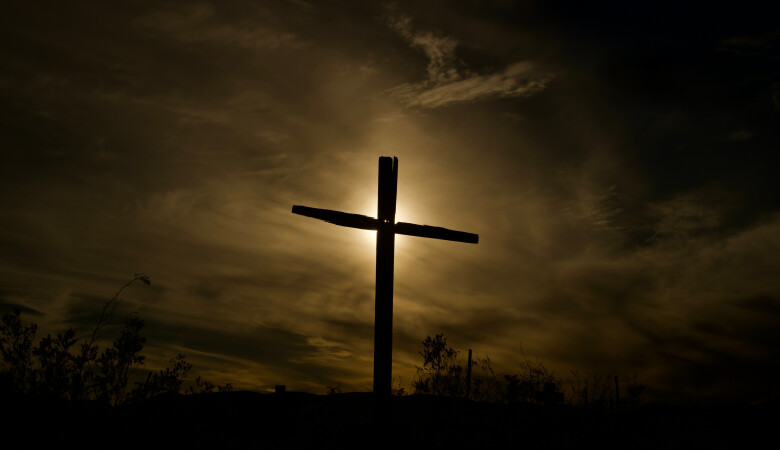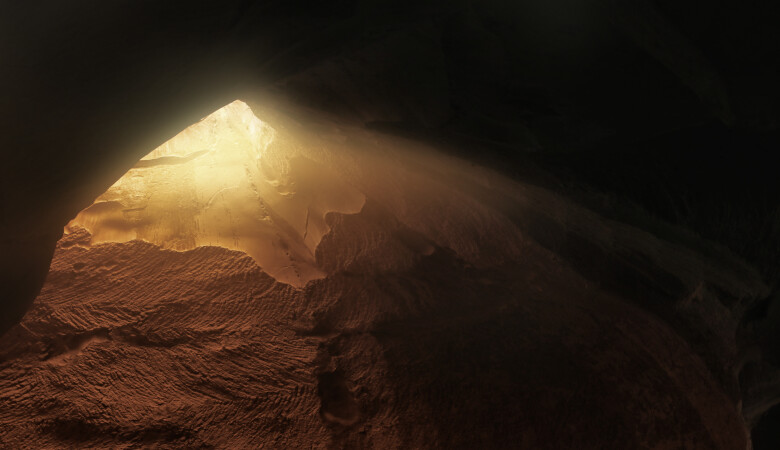Christ's Empty Tomb: Gateway to Eternal Joy
April 16, 2006 | Andy Davis
Psalms 16:8-11
Resurrection of Christ
sermon transcript
Introduction: Gateway to a New World
I can't wait to preach this message. I am so excited. Psalm 16 is a gateway to eternal joy for us. It's been a gateway in my life, and I look forward to proclaiming that today. Amen? In C.S. Lewis' fantasy novel, the classic The Lion, the Witch, and the Wardrobe, set in World War II, during the time of the Blitz in London, four children are removed from that danger and they're out in a countryside manor where they are immediately bored because there's nothing to do. So they start to play hide and seek. And one of them, a little girl finds a great hiding place in a wardrobe, what that is is a stand-alone closet that has all kinds of old clothes in it, and so she hides in there and decides to improve the hiding place by moving further and further back in the wardrobe until strangely, she feels some branches brushing across her face and she feels the chill of winter air and the smell of a forest in winter. She doesn't know this, but she has passed through a gateway into a world called Narnia, and that's the foundation of The Lion, the Witch, and the Wardrobe.
This theme is a major one in literature, the idea of passing through a gateway, a portal into a whole different world. In Lewis Carroll's classic, Alice in Wonderland, in the first version, she follows a rabbit down into a rabbit hole and tumbles a long, long time into another world, and in the sequel, she goes through a looking glass into a looking glass world, Alice in Wonderland. Frances Hodgson Burnett wrote a book, The Secret Garden, in which a young girl named Mary Lennox discovers a key and then finds the door that it unlocks and it's a vine-covered door, it doesn't look like it's been opened in decades, and she goes through into a secret garden, and the whole story is based on her passageway into that secret garden.
You've heard perhaps of the Arabian Nights, 1,001 nights, one story after another, and one of the stories was entitled “The Man Who Never Laughed Again.” I remember hearing this story when I was a child, and it made such an impression on me, and it wasn't until about two weeks ago that I rediscovered where it was. And in this story, there's a young man who takes care of 11 other men who spend their whole day weeping all day long, but he's not allowed to ask why. Finally, one by one all of them die off, and as the last one lays on his deathbed, this man wants to know “Why are you weeping all the time?” And he's told that in the courtyard where they sat all the time, there was a hidden doorway in the corner behind some vines, and if you would just move the vines and go through that doorway, he would find out, but the man who was dying begged him not to do it because he loved him as a father loved his son. Well, he goes through, of course, he's gonna go through the door. There wouldn't be a story otherwise. He goes through the door, a three-day journey leads him to a mysterious beach, an eagle plucks him off the beach, carries him between heaven and earth to a distant island where he's dropped there. He ends up meeting a beautiful woman who is a princess, she wants him to be her husband. They marry. He's the king of a whole fantastic realm, and he lives in bliss there, but he's told there's a door in a certain place he should never go through. And it just weighs in his mind all the time. He's tempted and finally, he says, “You know, last time I went through a door, look what happened. The next door, it might get even better.” So he goes through the door, next thing he knows, he's back on a beach, the eagle takes him back where he started, he sits there waiting for three months, and the eagle doesn't come back and he crawls back up the tunnel and he's back at the original garden where he started. He spends the rest of his life weeping like the other 11 men did. And I'm thinking, “Oh my goodness, what a dreary story.”
But the common theme of all of these is the portal or a gateway into another world. A world where things are different. Let me tell you something, none of these mysterious gateways is as spectacular and exciting as the gateway that is Jesus's empty tomb. Amen? It is a gateway into a real world of eternal joy and bliss in the presence of God. You see, Christ died on a cross, his body was wrapped up in linens, he was laid in a new tomb in which no one had ever laid. And a stone was rolled in front of that tomb, but on the third day, Jesus arose, came out of those grave clothes, passed in some mysterious way through the wall of the tomb, and began a journey that changed the history of the world. A journey of convincing people, skeptics, unbelievers, that he was God in the flesh, and that he holds in his hand the keys of life and death, and that through faith in his name, eternal life is yours. That journey has been going on now for 2,000 years. And I'm convinced that Jesus has physically been raised from the dead, and that empty tomb has become for me a gateway into eternal joy.
Today, Christ is beckoning all of us to follow him. To begin the journey there at the empty tomb and to follow him through the door into a life that will never be the same again, and unlike Lucy in the wardrobe, it's not an invisible fantasy world called Narnia. Unlike Alice, we're not heading to Wonderland. Unlike Mary Lennox, it's not some earthly garden, which she fixes up through her knowledge of gardening. And unlike the man who never laughed again, we're going to a place where joy will never end, and while we cannot lose the paradise we gain, it's not a paradise of earthly sensual delights as in the 1,001 Nights, no, it's a place of eternal joy at the right hand of a holy God, that's where we're traveling.
Gateway Predicted
Predictive Prophecy: Supernatural Evidence for Christ
Now, this gateway that I'm referring to - although the word gateway isn't found in Psalm 16, but that's what it is - it's a doorway really into the presence of God. It is a doorway or a gateway that was predicted a thousand years before Christ was born. Look at verse 11 in Psalm 16. The prophet who wrote Psalm 16 is King David, one of the greatest prophets, the greatest kings of Israel. He was the greatest king of Israel, and he was also a prophet, and he wrote Psalm 16 a thousand years before Christ. And in verse 11, it says there, “You have made known to me the path of life; you will fill me with joy in your presence, with eternal pleasures at your right hand.”
Now, predictive prophecy is supernatural evidence to the truth of the gospel, is supernatural evidence to the truth of Jesus' claim that He is God in the flesh. What do I mean by that? Well, none of us knows the future, we don't know what's going to happen tomorrow, we sure don't know what's gonna happen in a thousand years, but God has all of history in his mind and he enabled prophets to write about things long before they took place. And so this ancient Hebrew writing carries within it a prediction of the resurrection of the Christ.
Look at the beginning of verse 7 and following, it says there, “I praise the Lord who counsels me. Even at night, my heart instructs me. I have set the Lord always before me. Because he is at my right hand, I will not be shaken. Therefore my heart is glad and my tongue rejoices, my body also rests secure because you will not abandon me to the grave,” listen, “Nor will you let your Holy One see decay. You have made known to me the path of life; you will fill me with joy in your presence, with eternal pleasures at your right hand.”
Psalm 16: The Key Concept Is “This Could Not Have Been David”
Now, the key concept of this predictive prophecy in Psalm 16 is that this statement in verse 10 could not have been David. Even though David wrote it, it could not have been referring to him. Now, much of Psalm 16, perhaps, could refer to David's life and his struggles, and God's faithfulness to him, but there is this one statement in verse 10, where he says, “You will not abandon me to the grave, nor will you let your Holy One see decay.” A very interesting statement, very specific.
Now, on the day of Pentecost, 40 days after Christ had been risen, the Apostle Peter stood up and preached to a huge crowd in Jerusalem that was gathered for that Jewish feast. And after quoting this Psalm, Psalm 16, he said this. He said, “Brothers, I can tell you confidently that the patriarch David died and was buried, and his tomb is here to this day, but he was a prophet, and he knew that God had promised on oath that He would place one of his descendants on the throne. Seeing what was ahead” - that's predictive prophecy - “seeing what was ahead, he spoke of the resurrection of the Christ, that he was not abandoned to the grave, nor did his body see decay. God has raised this Jesus to life, and we are witnesses of the fact.” Let me tell you, his sermon is one of the greatest sermons in history, because 3,000 people were converted that day and added to the church.
Several years later, the Apostle Paul preached a similar sermon in a synagogue in Pisidian Antioch, would be in modern day Turkey, and he made the exact same point based on Psalm 16. He said there, “The fact that God raised him from the dead, never to decay, is stated in these words: ‘You will not let your Holy One see decay.’ For when David had served God's purpose in his own generation, he fell asleep; he was buried with his fathers and his body decayed. But the one whom God raised from the dead did not see decay.” That's in Acts 13. So both the Apostle Peter and the Apostle Paul make the same point right from the Psalm we're looking at this morning. That it is predictive prophecy that could not have referred to David. It referred to Christ.
Christ: Protected from Corruption, Raised in Power
Now, God specially protected the body of Christ from corruption, He protected it from decay. Now, we live in a world filled with corruption. I don't just mean the corruption you see in politics with graft and all that, I mean literal biological corruption and decay. It's built into the food cycles that we just are aware of and surround us all the time.
The leaves that I blew off my yard or raked off my yard last fall, I wish I could sell them and get some money for them. Every year I raise a harvest of leaves. I don't get much for them, and so we just move them off to the woods that surround my yard, and we just let them sit there. And the rain and the weather and all that, they just decay. They just break down and they return to the soil where they came from. Paul said that the whole physical world around us is in bondage to decay. In Romans 8:21, it says, “Yearning to be liberated from its bondage to decay,” the whole world surrounding us.
Now, this is especially poignant and powerful when it comes to the issue of the human body after death. It says in Psalm 49:14, it says, “Like sheep, they are destined for the grave, and death will feed on them. Their forms will decay in the grave, far from their princely mansions.” Well, that is our physical future. I know it's not pleasant to think about, but that is the truth. The body is reduced to corruption and it begins to stink with a bad odor.
With forensic science, the medical examiners are able to set the time of death based at least in part on the process of decay, because we have microorganisms within us, and as soon as we stop living, they begin to feed on our internal organs, not long before corruption comes. Now, this has happened to every dead person in history, except one, and that is Jesus Christ. And the fact that God would not permit it to happen to Jesus' body was predicted a thousand years beforehand, so this is a gateway that has been predicted.
Gateway Purchased
The Most Expensive Gateway in History
Secondly, it's a gateway that is purchased. A gateway that's been purchased. And I tell you it is the most expensive gateway that has ever been purchased in history. Now, I like to go to St. Louis, we've had some relatives that live there, and they have there the great arch. It's the symbol of St. Louis, and it was built in 1965 at the cost of $23 million. And at the base of the gateway, or at the base of the arch, is a plaque that says “St. Louis, Gateway to the West.” That's where Lewis and Clark's expedition went out. A lot of travelers went to St. Louis and got equipped for their journey west, and so it became, that city became the Gateway to the West. The arch, 630 feet high, 630 feet wide is called the Gateway Arch, and it cost $23 million.
Perhaps the most famous monumental arch is the “Arc de Triomphe” in Paris. Napoleon built it or started to build it in 1806, after his triumph at Austerlitz. No one knows how much money they spent to build that. Especially when you think about the cost of the arch, you factor in all the lives that were squandered as Napoleon pursued his desire for a French empire in Europe, that was a very costly arch. And then in ancient Babylon, there was something called the Ishtar Gateway. It was the most spectacular of all of the gateways into the ancient fortress city of Babylon. It was covered with rubies and diamonds and all kinds of things, which are no longer there, but they have the actual arch and it's really spectacular.
Let me tell you something. There is no gateway in world history, there's no gateway in the world today that's as expensive as the gateway that Jesus opened up for us into the presence of God. Well, what do I mean by that? Well, what we're talking about here is a gateway into eternal pleasure at God's right hand, a gateway into eternal life. Well, the cost of our eternal life is his infinite death, and I say infinite in that he was and is the Son of God, and when he shed his blood on the cross, that's an infinite payment, and he paid it for us.
In Ephesians 1:7, it says, “In Christ, we have redemption through his blood, the forgiveness of sins.” The word redemption involves the recovery of slaves by the payment of a price, and Jesus paid the price to redeem us from our sins. Also says in 1 Peter 3:18, “Christ died for sins once for all, the righteous for the unrighteous, to bring you to God. He was put to death in the flesh, but made alive in the Spirit.” And so again, this gateway has been purchased. This is the costliest gateway ever built.
Greatest Barrier: Our Sin and God’s Holiness
Now, when we talk about an approach to God, coming into the presence of God, we have to think, what is the barrier that separates us from God? And the barrier is the combination of our sinfulness and God's holiness. It creates an impenetrable barrier that we could never find a way to open. We could never come into the presence of God as a result. God says in Isaiah 57:15, it says there, “This is what the high and lofty one says, he who lives forever, and whose name is holy: ‘I live in a high and holy place.’” How can we sinners live with him? God says in Habakkuk 1:13 that his eyes are too pure to look on evil. He cannot tolerate wrong. He can't even look at evil, how could he dwell with it forever? This is a barrier between us and a holy God.
When Adam and Eve sinned in the Garden of Eden, they were cast out of that perfect place because they ate from the tree of the knowledge of good and evil, and they were put under the death penalty. And it says that the way back into paradise, back into the garden, back into the place where the tree of life was, was guarded by an angel who had a flaming sword flashing back and forth, basically saying, You can never get in here, the penalty for getting in here is death. And so the only way an opening could be made into paradise, into the presence of God is by the payment of a death penalty.
Old Covenant Barriers and Exclusions
God established this barrier idea in the Old Covenant again and again. There are these barriers that separate the people of God from the presence of God. Walls and curtains and different things that basically are saying this message: “You are not welcome in the presence of a holy God.” A good example of this is right in the temple in Jerusalem right there. There was a central place where the ark of the covenant was, and that was the place where God met with the people symbolically, that's where he met. And there was a cubicle room called the Holy of Holies, and another room was there called the Holy Place, but this was the Most Holy Place, and the Holy Place was separated from the most holy place by a curtain in the temple.
The courtyard was a place any Jew could go. We Gentiles, we wouldn't be permitted in there, on penalty of death. But any Jew could go in the courtyard, any priest could go in the Holy Place, but only the high priest could go in the Holy of Holies, the Most Holy Place, and that only once a year, and never without blood, which he offered for himself and for the sins the people had committed in their ignorance. And God was showing by this that the way into the Most Holy Place had not been disclosed as long as that tabernacle was still standing, the book of Hebrews tells us.
A “New and Living Way” Opened for Us
Now, the moment that Jesus died on the cross, a miracle happened. That curtain in the temple was torn in two from top to bottom. It was a miracle of God. From top to bottom it ripped showing that the book of Hebrews says, “A new and living way had been opened up for us into the very presence of God.” That's what it says in Hebrews 10:19-20, it says, “Therefore, brothers, since we have confidence to enter the Most Holy Place by a new and living way opened for us by the body of Christ, let us draw near to God.” That is the gateway I'm talking about today. It is a gateway that was purchased at the cost of the blood of the Son of God.
Gateway Proven
Christ’s Resurrection: A Matter of History First, Then Theology Second
Now, the moment that Jesus purchased that gateway, when he said, “It is finished,” and he died, the gateway had been purchased, the way was open, but it had to be proven to the onlooking human race, it had to be proven to us, so that we could know that it was open. And so the third step is that the gateway had to be proven, and God did this in space and time, he did it in history by the resurrection of Jesus from the dead. Now, Christ's resurrection is a matter of history first and theology second. I say to you, if it didn't really happen, then there's no point in talking about it. I say to you, if there was no historical resurrection, then any theology about the resurrection is a waste of time. And so this is a matter of history first and theology second.
Without the resurrection of Christ, friends, we have no Christianity. I'm up here for nothing. You're here celebrating nothing. And we are still in our sins, and we have no hope on Judgment Day if Christ has not been raised. H.P. Liddon put it this way, he said, “Faith in the resurrection is the very keystone of the arch of Christian faith, and when it is removed, all must inevitably crumble to ruin.” Philip Schaff, the great church historian, said this, “The resurrection of Christ is therefore emphatically a test question upon which depends the truth or falsehood of the Christian religion. It is either the greatest miracle or the greatest delusion which history records.” Those are the choices we have. It's either a great miracle or it's a great delusion, but history records it. It's a historical matter.
Three Great Evidences
And so therefore we have to ask the question, “What evidence is there that this gateway has been opened?” And I think God has given us at least three great evidences of the resurrection of Christ. The first is the empty tomb. The empty tomb is proof that the gateway has been opened. Now, on that first Easter morning, a series of eyewitnesses came to the place where Jesus's body had been laid. One after the other came and they looked at the evidence of the resurrection. John 20 records one of these accounts, these eyewitness accounts.
They went to the tomb, the stone had been removed from the entrance, and Mary Magdalene, and then Peter and John went in and they looked, and you know what they saw inside? They saw the grave clothes of Jesus, I believe in the shape of his body, somewhat like a cocoon, and the body of Jesus had somehow come through those grave clothes. They also saw the head covering folded separately laying by itself. And the physical evidence just screamed, “Resurrection.” Now, Luke tells us, Peter saw and wondered. But John, John's gospel says that John saw and believed. And I think if you had the privilege this morning of standing on that first Easter morning and looked at that evidence, I don't think you'd have any trouble believing. There's no other explanation. The physical evidence of the empty tomb, it's there.
Now, I say to you that an empty tomb alone doesn't prove a resurrection, does it? Mary Magdalene looked in and saw the empty tomb, and she wasn't convinced yet of a resurrection. We'll talk more about that in a minute. Peter wasn't sure yet. They just knew the body wasn't there, that's all. They weren't sure why. Lee Strobel in his book, A Case for Easter, which we've given out to our guests, if you're a guest, please grab hold of that book, that is a wonderful, short description of some of the evidence of the resurrection for Christ. But he tells an interesting story about a young girl who died tragically in 1963.
He talks about an empty tomb in Birmingham, Alabama. This is what he wrote. “In 1963, the body of 14-year-old Addie Mae Collins, one of four African-American girls tragically murdered in an infamous church bombing by white racists was buried in Birmingham, Alabama. For years, family members kept returning to the grave to pray and leave flowers. In 1998, they made the decision to disinter the deceased for reburial at another cemetery. When the workers were sent to dig up the body, however, they made a shocking discovery. The grave was empty. Understandably, the family members were terribly distraught. Hampered by poorly kept records, cemetery officials scrambled to figure out what had happened. Several possibilities were raised, the primary one being that her tombstone had been erected in the wrong place. Yet in the midst of determining what had happened, one explanation was never proposed, and that is that young Addie Mae had been resurrected to walk the earth again. Why? Because in itself, an empty tomb does not a resurrection prove.” Well, he's right. You look at Mary Magdalene, she's standing there and looking in and what has she concluded? “They have taken him away, and I don't know where they've put him,” that's what she was thinking until something happened.
And here's the second great evidence. She turns around and she has an encounter with the resurrected Christ personally. The account is in John 20, “She turned around and saw Jesus standing there, but she did not realize that it was Jesus. ‘Woman,’ he said, ‘why are you crying? Who is it you're looking for?’ Thinking he was the gardener, she said, ‘Sir, if you have carried him away, tell me where you have put him and I will get him.’” To me, that's one of the funniest lines in the gospel of John, thinking he was the gardener. No, he's not the gardener. He's the resurrected Lord, the savior of your soul, but she didn't know it yet. Somehow he looked different. His appearance was somehow changed. But then Jesus spoke one word to her, he said, “Mary,"” he spoke her name in Aramaic, Miriam probably, and she turned and cried out in Aramaic, “Rabboni!” which means my teacher, my rabbi, and she grabs hold of him at that moment, and Jesus said, “Do not hold on to me for I have not yet returned to the Father. Go instead to my brothers and tell them I'm returning to my Father and your Father, to my God and your God.”
And Mary Magdalene went to the disciples with the news, “I have seen the Lord!” and she told them that he had said these things to her. Mary Magdalene, however, was not the only eyewitness of the resurrected Christ. Jesus had a series of encounters with people one after the other. The New Testament records are full of these eye witness accounts. The Apostle Paul kind of organizes them all for us in 1 Corinthians 15. He said this, “For what I received, I passed on to you as a first importance, that Christ died for our sins according to the scriptures, that he was buried, that he was raised on the third day, according to the scriptures, and that he appeared to Peter, and then to the 12, and after that he appeared to more than 500 of the brothers at the same time,” 500, “most of whom are still living, though some have fallen asleep. And then he appeared to James and then to all the apostles, and last of all, he appeared to me also as to one abnormally born.”
Now, in a court trial, all you need, at least in Bible times, is two or three witnesses. On the testimony of two or three witnesses, every matter is established. Well, the Lord lavished on the human race well over 500 eyewitnesses of the resurrection of Christ. Josh McDowell points out that if all 500 eyewitnesses strained in the witness stand, each one gave six minutes of testimony, including cross-examination, you would have 50 hours of testimony. Do you think that would settle the matter in the court of law? I would think so.
And so we have secondly, the eyewitness encounters with the resurrected Lord. But then thirdly, you have the extraordinary explosion of Christianity through the first three centuries after Christ. You know what they're gonna tell us these days, you see it on the news, you see it on 2020 and all that, that these stories are myths that were written 200, 300 years later, it is impossible. It is a fact that in the year 312 AD, the Emperor Constantine, the Roman emperor, declared himself to be a Christian. That shows the progress that Christianity had made in three centuries. That's extraordinary.
Now, what was the basis of the explosion of Christianity? I tell you, it was the empty tomb of Jesus Christ and these eye witnesses who preach fearlessly and courageously that they had seen the risen Lord. You couldn't shut these people up. And how do we explain the transformation in these disciples? They were just like us. They were running and hiding. They were in a locked room for fear of the Jews. They wanted to go back to fishing. They were done with Jesus. Then all of a sudden, 40 days later, they're in downtown Jerusalem fearlessly preaching that they have seen the resurrected Christ? How do you explain that? Well, I know how I'd explain it. They saw the Lord, and they weren't afraid to die anymore.
J.P. Moreland put it this way, “When Jesus was crucified, his followers were discouraged and depressed, and so they dispersed. The Jesus movement was all but stopped in its tracks. Then after a short period of time, we see them abandoning their occupations, re-gathering and committing themselves to spreading a very specific message that Jesus Christ was the Messiah of God, who died on the cross, returned to life and was seen alive by them, and they were willing to spend the rest of their lives proclaiming this without any payoff from any human point of view. They faced a life of hardship. They often went without food. They slept exposed to the elements. They were ridiculed, beaten, imprisoned, and finally, most of them were executed in torturous ways. And for what? Because they had good intentions? Hardly so. It's because they were convinced beyond a shadow of a doubt that they had seen Jesus Christ the Lord risen from the dead.” The empty tomb, eyewitness accounts of having seen the risen Lord, and the explosion of Christianity through the first three centuries after Christ, all speak to me of a gateway that is proven opened. Jesus is risen.
Gateway Proclaimed
Proclaimed by Whom?
And fourthly, this is a gateway that is proclaimed. It's proclaimed. Well, by whom? Well, first by the Apostle Peter and the other apostles, secondly by the Apostle Paul at Pisidian Antioch, as we mentioned, and since that time, by pastors and missionaries and witnesses for 20 centuries in every nation on earth. This is a gateway that's been proclaimed and believed all over the world for 20 centuries.
A Proclaimed Gateway into What?
Now, you may ask, a gateway into what? Look again at verse 11. It says there, “You have made known to me the path of life, you will fill me with joy in your presence with eternal pleasures at your right hand.” What are we stepping into when we believe in the resurrection of Christ? When we step through that gateway, into what are we stepping? Well, look what it says. First of all, it says, “Fullness of joy and eternal pleasure.”
No one can deny we live in a pleasure-soaked age. People desperately seeking pleasure from all sources, hobbies like golfing or gardening or four-wheeling or horseback riding. Gadgets like a new massage chair from Sharper Image, costs you $889, get all those tough spots that are hard to get, or entertainment like DVDs and spectator sports. We're looking for all kinds of things to fill an emptiness inside that only God can fill. And you know what he's saying when he looks down from heaven? He says, “You don't know joy, and you don't know pleasure until you come to be in my presence.” That's where it is.
So he's talking about the fullness of joy. The word “fullness” there literally means to be full to overflowing. Imagine a grain silo after a record harvest and they don't know where to put all the wheat. It's just pouring over. It's overflowing with wheat. That's what we're talking about here. It's the joy of full forgiveness of all of your sins, of knowing that we can stand before God on Judgment Day, blameless and unafraid because Jesus has paid the price, and his blood is enough for me and you. It's the joy of knowing that as we heard Melvin do earlier, if you confess with your mouth, “Jesus is Lord,” and believe in your heart that God raised him from the dead, you will be saved. It's the joy of being in the family of God, adopted as a son or daughter of God by simple faith in Christ, and he will never leave you, he will never forsake you.
It's the joy of living a new kind of lifestyle. Look at verse 11, “You have made known to me the path of life.” There is a path to be traveled. I don't know if you haven't noticed, but we're not in heaven yet. Have you noticed? I mean we tried to make it look pretty here. They worked hard, didn't they? I mean, it looks nice. But friends, this isn't heaven. Did you know that? It isn't. And that's okay, because we're not there yet. There's a journey to be traveled. There's a path of life. And Jesus said, “I am the way and the truth and the life. No one comes to the Father except through me.” And we're gonna be walking a new life. Romans 6:4 says, “Just as Christ was raised from the dead by the glory of the Father, we too might walk in newness of life.”
And what awaits us at the end of this new life? It's a gateway through physical death, a gateway into the very presence of Almighty God, “eternal pleasures at your right hand.” Oh, isn't that sweet? Isn't that sweet? In a moment, Keith Pendergraft is gonna sing one of my favorite songs, “God and God Alone.” I love that song. And in the final verse, it says this, “God and God alone will be the joy of our eternal home. He will be our one desire. Our hearts will never tire of God and God alone.” The eternal pleasure of God.
And we will have an expanded capability to take it in. We won't be bored, we won't be disinterested, we won't be in physical pain, we won't be distracted, we'll have nowhere we need to go, we will just be there soaking in the most fascinating, the most creative, the most powerful being in the universe, God, and he will be an infinite source of pleasure and joy for us. That's the gateway Jesus has opened up for us. I'm not afraid of death anymore. Are you? I'm looking forward to it. As long as my work is done here and he decides when I'm ready to go through that gateway into the very presence of God.
And the pleasure of a new heaven and new earth, a new world, I can't even describe it to you, I don't know what it will look like. It'll be a world where the glory of God will shine all around us, where there'll be a perfect new creation, a regenerated world in which there'll be no more death or mourning, or crying or pain, no decay, no problems, a perfect world. And best of all, it will never end.
Every year, around the fall, when I was living up in New England, I'd go up and look at the foliage in the middle of October, and just the colors are so spectacular that time of year. It was a long weekend, and we would go to the Kancamagus Highway up there in New Hampshire, and we'd sit up on a rocky hill and we would just look at the valleys all around and the beautiful foliage colors, and we'd sit there until the sun would go down, and it'll be Monday evening as the sun was going down. And once the sun dipped down below the horizon, we would just sigh. And it was not a sigh of contentment. It was a sigh of depression, because in a minute we were gonna get in our cars and we're gonna drive back home to school or work, or burdens that we had hoped to escape. We're hoping some little elves would take care of all of that while we were gone, but they didn't, and we know it. And so we're going back to struggle and to work. Friends, we're gonna go to a place where we won't ever have to leave, eternal pleasures at his right hand. Oh I'm looking forward to that.
I wanna close now by just appealing to your faith. Faith is like the eyesight of the soul. I want to ask you to come with me into the empty tomb. I want you to see by eyes of faith, the grave clothes lying there, wholly undisturbed in the shape of Jesus body. I want you to see the head covering folded up by itself, that you can look through the door, through the door to the outside world, there is the stone removed and laying up on a hillside nearby, and you see the light coming in, it's enough light to see in there, but you're not gonna be there forever, because you're convinced Jesus has risen. Now, what I'm asking is, are you ready to walk through that doorway into a whole new life unlike you have ever lived before? And at the end of that life is another gateway called death, where we will be separated from these corruptible bodies, and we'll go into the very presence of God? Are you ready through faith in Christ to take that journey with me? If so, just put your trust in him right now, in your hearts, say, “Lord, I want you to be my savior. I wanna trust you for the forgiveness of my sins.” And just inside your heart, you pray, “Lord, I'm calling on you to be my Lord and my Savior, I trust in you. Lead me through that gateway into your presence.” Close with me in prayer.

